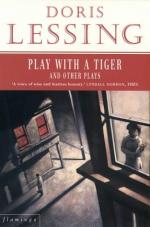|
This section contains 1,136 words (approx. 3 pages at 400 words per page) |

|
Post-War Britain
Britain was a thoroughly chastened nation by the end of World War II. Its vast world empire, which it had built up over the course of the nineteenth century, was unraveling. Many of its former colonies had achieved, or were in the process of fighting for, their independence. Furthermore, London, amongst other cities, had been devastated by German bombing campaigns during the war.
In addition to rebuilding and regaining economic stability, postwar Britain was experiencing significant changes in its sociocultural makeup. In the earlier part of the twentieth century, roughly speaking, Britons tended to fall into either one of two major social groupings: the working class/small shopkeepers or the upper-middle/aristocratic classes. A modern, white-collar, middle-class population had begun developing in the 1930s, but its ranks were as yet quite small.
The cultures of Britain's two major class groupings were widely distinct. The urban working...
|
This section contains 1,136 words (approx. 3 pages at 400 words per page) |

|




